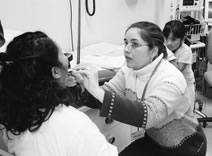|
La Clinica De La Raza:
Making the Most of Scarce Resources to Deliver Quality Care. How Deep Can You Cut Without Bleeding? March April 2003 Since its beginnings in 1971, La Clinica de La Raza has served over 100,000 clients and brought 10,000 healthy babies into the world. La Clinica began as a free clinic run by and for the Oakland Fruitvale Community, which was largely Spanish speaking. The original clinic was in a converted house, since then the agency has expanded to eight medical clinics: two dental clinics, two eye clinics, a mental health clinic, and multiple ancillary health services. La Clinica has a staff numbering over 300 workers serving a large portion of the East Oakland community. In addition to Spanish they have medical staff that speak Cantonese, Arabic, Vietnamese, Tagalog, and the African languages Tigrinya and Amharic. About 70% of La Clinica’s patients are uninsured, and the funding for their care comes from the county. Many of these medically indigent patients would otherwise end up at county hospital clinics or worse at the emergency room where the cost of care is much higher. “I think we do a terrific job with what we have even though it is not what a private care setting could offer,” La Clinica physician Lindsay Sedgwick states.
But with state and federal budget cutbacks, La Clinica is facing major cuts. Everyone is waiting for the final version of the state budget but Local 535 union field representative Ron Rhone has been told that at least $1 million may be cut from La Clinica’s $12 million budget. And that is the mid-term 2002-2003 budget. The budget cuts in 2003-2004 are likely to be even higher. “We are already pretty thrifty, and any further limitations would make it challenging to provide a high standard of care for our patient population,” states Sedgwick. Sedgwick is already limited to certain types of medication she can prescribe. Often she will have to prescribe one medicine when there may be others that are more effective or have fewer potential side effects, but La Clinica’s pharmacy cannot afford to stock more expensive alternatives. “I just got a referral from our behavioral health department for a patient who is on an expensive medication called Zyprexa. It’s a medication that has fewer side effects but is much more expensive than the other anti-psychotics that we stock in our pharmacy. So I’m going to have to look for other sources to obtain that medication.” She will have to take time out from seeing patients to fill out applications to patient assistant programs that provide medication either free or at a reduced rate.
The staff overcomes its lack of resources through a teamwork approach that makes the most of health and nutritional education. For that reason doctors like Sedgwick enjoy working at La Clinica, “We have a pretty amazing team approach to care. We have a full nutrition department, a full social service department, a full behavioral health department, and we have pediatrics and obstetrics on site. We’re all family practitioners, but we are able to provide specialty services within our organization. On our limited scale, it is quite impressive,” she explains. She is concerned about weakening any link in the chain. “Say you have three specialists who can see patients who are in desperate need. If they cut back to one you’ll only have a certain number of clinic visits available. So it’ll extend desperately needed services back three, four, six months, depending on how over-booked they get. And they’re already at pretty much full capacity in all departments. An example would be a diabetic who needs to learn how to check their blood sugar level, and make sure they stay away from certain types of foods. If they don’t have that basic information, they can develop all sorts of complications, ranging from foot ulcers to tooth infections, or other complications.” Triage nurse Scott Taylor is one of the links in the chain. La Clinica has a 24-hour advice line, and he is one of the staff who works on it. He evaluates the patients’ medical problems and provides help over the phone or schedules appointments. After he sets appointments for patients, he calls them to make sure they follow through with their treatment. Taylor sees drop-in patients, and makes appointments for them with appropriate clinics. He also spends time with patients educating them on their medication and teaching them about their medical issues. Taylor is known for going the extra mile. When patients have a lot of medication, he will set up pill boxes with the right pills in different compartments for them to take for each day of the week. Taylor is concerned with the amount of time it takes to get his patients the treatment they need from specialists at the county hospital: “If I have a patient with a neurological disorder like multiple sclerosis, they may have to wait three or four months to be seen at Highland. We’ve had clients with lesions on the brain and the longer they wait the more serious it gets. In situations like that you want to start treatment right away, but they end up having to wait for months and the condition becomes more severe and more expensive to treat.” He is also worried about serving patients in-house at La Clinica in a timely manner, “We are always short staffed by about 75%, and with the cutbacks it is going to get worse.” Physician’s assistant Michael Terry did a survey of wages at La Clinica and compared them to comparable positions at the Alameda County Medical Center and its clinics. He found that workers at La Clinica made between 20% to 60% less, depending on the number of years of service. After long negotiations, La Clinica had committed to raising the wages for its workers. One of these raises was to go into effect this past January 1st, but because of the expected budget cuts management is withholding the increases. The union is negotiating with management over the issue. “People don’t work here for the money, but they still need to pay their rent and eat,” he states. Everyone is holding their breath over the budget.
|
||||||||||||||||||










